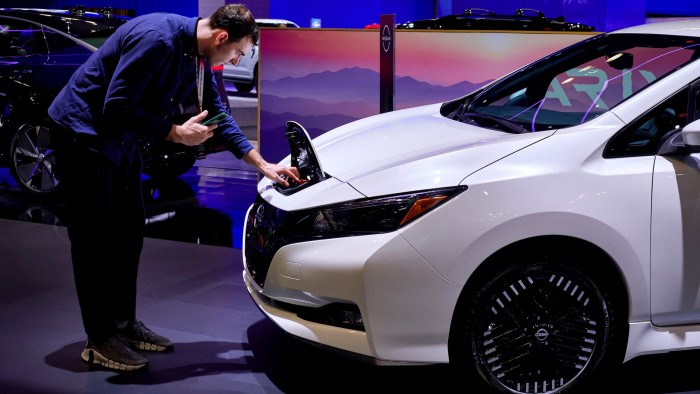Stay informed with free updates
Simply sign up to the Electric vehicles myFT Digest — delivered directly to your inbox.
A new UK subsidy scheme designed to boost the sales of electric cars has created confusion across the industry and is likely to hit short-term sales and second-hand car prices over the longer term, automotive executives have warned.
The application for the £650mn grant kicked off on Wednesday, but carmakers will have to wait for weeks to learn which of their models will be eligible for the subsidies.
Only Nissan has said its new electric Leaf model, which will be produced at its Sunderland plant, will be likely to be eligible.
Under the scheme, households will receive a discount of up to £3,750 per vehicle when they buy a new electric car that is priced less than £37,000.
But the eligibility criteria is detailed with each model to be rated according to the carbon emissions of the electricity grid in the country or countries of critical production stages.
The cars considered “greenest” will receive a discount of up to £3,750, while others in a lower band will receive up to £1,500. A third band that includes most Chinese-made cars will not receive any subsidy.
Some carmakers have created “a war room” to figure out which models fall under which band, especially with confusion over some of the eligibility criteria — such as the one mandating carmakers to be committed to the science-based targets for cutting greenhouse gas emissions.
According to the Science Based Targets initiative, Nissan is committed to the short-term emissions targets but not to reaching net zero by 2050. Government guidelines state a carmaker needs to be committed to the targets, but also allows room for those committed to only short-term ones.
“It’s a total mess,” said one director at a carmaker. Another said: “This is what the industry wanted . . . but there is going to be a lot of uncertainty, which is the last thing we need.”
The Society of Motor Manufacturers and Traders will host a roundtable with Department for Transport officials on Thursday to address questions surrounding the grant.
The government on Wednesday said it “had multiple calls with vehicle manufacturers to explain vehicle eligibility and how to apply for the grant, and we will continue these discussions to ensure manufacturers have all the information they need”.
Many carmakers have welcomed the government’s efforts to accelerate the electric transition, saying the subsidies will stimulate consumers’ interest in EVs and boost sales.
But some industry executives also warned that subsidies targeting only new EVs would lead to value destruction in the second-hand car market, which could ultimately lead to higher finance costs for new EVs.
The majority of cars in the UK are purchased on finance deals based on how much value the vehicle will lose over three years. Weaker second-hand prices for a car will therefore result in higher monthly payments for a first-time buyer.
Toby Poston, chief executive of the British Vehicle Rental & Leasing Association trade group, said stimulating new EV demand without supporting the used market would put more pressure on “fast-deflating second-hand values”.
“The resulting losses will erode confidence and result in higher finance costs for new EVs, eliminating much of the benefit from the original grant,” he added.
Even before the new grant was announced, the leasing sector, which accounts for about three out of four new EV purchases, had wrestled with volatility in the used EV prices and had called for support to stabilise the market.
James Buxton, chief commercial officer at Car360, the UK’s largest independent used EV specialist, said the scheme should have been designed in a way so that it could be implemented straight away since many consumers would wait to buy or lease EVs until it became clear which models will become cheaper.
“Stimulus is good but it would have been much better to have a balance between new and used EVs because you need a healthy used car market to support residual values,” he said.
Tom Leathes, head of used-car marketplace Motorway, said the benefits of the scheme would probably outweigh any near-term drop in sales. “The more new EVs purchased today, the more choice consumers will have in the used market in three to five years.”


